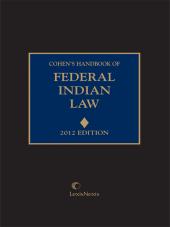Cohen's Handbook of Federal Indian Law
Select a format
 International Order Inquiry
International Order Inquiry
Select subscription type
Terms & conditions
Subscribers receive the product(s) listed on the Order Form and any Updates made available during the annual subscription period. Shipping and handling fees are not included in the annual price.
Subscribers are advised of the number of Updates that were made to the particular publication the prior year. The number of Updates may vary due to developments in the law and other publishing issues, but subscribers may use this as a rough estimate of future shipments. Subscribers may call Customer Support at 800-833-9844 for additional information.
Subscribers may cancel this subscription by: calling Customer Support at 800-833-9844; emailing customer.support@lexisnexis.com; or returning the invoice marked "CANCEL".
If subscribers cancel within 30 days after the product is ordered or received and return the product at their expense, then they will receive a full credit of the price for the annual subscription.
If subscribers cancel between 31 and 60 days after the invoice date and return the product at their expense, then they will receive a 5/6th credit of the price for the annual subscription. No credit will be given for cancellations more than 60 days after the invoice date. To receive any credit, subscriber must return all product(s) shipped during the year at their expense within the applicable cancellation period listed above.
The total price includes the product(s) listed in the Order Form and any Updates for a limited period (minimum period of 30 days) after the order is placed ("Order Window"). Shipping and handling fees are not included in the grand total price.
All shipments may be returned, at subscribers' expense, for full credit of the Price within 30 days of receipt.
Shipments may not be returned, and no credits will be issued, more than 30 days after receipt.
After the Order Window, subscribers will receive notice of Updates along with the then-current grand total price and order process as Updates become available. Subscribers will only be shipped those Updates they specifically request.
Product description
Note: If you do not subscribe to Cohen's Handbook of Federal Indian Law and wish to purchase the current supplement alone, please contact Telephonic Sales at 800-223-1940. If you are a current subscriber, you should receive this supplement automatically. If you have not received it, please contact Customer Service at 800-833-9844.
Cohen's Handbook of Federal Indian Law is an encyclopedic treatise written by experts in the field, and provides general overviews to relevant information as well as in-depth study of specific areas within this complex area of federal law. This is an updated and revised edition of what has been referred to as the "bible" of federal Indian law. This publication focuses on the relationship between tribes, the states and the federal government within the context of civil and criminal jurisdiction, as well as areas of resource management and government structure.
The 2012 Edition of Cohen's Handbook of Federal Indian Law, as updated in the 2023 Supplement, also includes coverage of:
• Current topics such as Indian gaming and taxation
• History and structure of tribal governments and tribal law
• Tribal and individual Indian property rights, including intellectual property rights
• Water rights
• Hunting, fishing, and gathering rights
• Economic development issues
• Government programs
This compact publication is the only comprehensive treatise explicating one of the most difficult areas of federal law. Used by judges as well as practitioners, this publication provides the tools to understand the law and to find relevant cases, statutes, regulations, and opinions critical to answering legal questions about federal Indian law. This updated edition remains the definitive guide to federal Indian law.
eBooks, CDs, downloadable content, and software purchases are noncancelable, nonrefundable and nonreturnable. Click here for more information about LexisNexis eBooks. The eBook versions of this title may feature links to Lexis+® for further legal research options. A valid subscription to Lexis+® is required to access this content.
Table of contents
Table of Contents
WHAT IS FEDERAL INDIAN LAW?
CHAPTER 1 HISTORY & BACKGROUND OF FEDERAL INDIAN POLICY
§ 1.01 Why History Matters
§ 1.02 Post-Contact and Pre-Constitutional Development (1492-1789)
§ 1.03 The Formative Years (1789-1871)
§ 1.04 Allotment and Assimilation (1871-1928)
§ 1.05 Indian Reorganization (1928-1942)
§ 1.06 Termination (1943-1961)
§ 1.07 Self-Determination and Self-Governance (1961-present)
CHAPTER 2 PRINCIPLES OF INTERPRETATION
§ 2.01 The Field of Federal Indian Law
§ 2.02 Canons of Construction
§ 2.03 Federal Laws of General Applicability
CHAPTER 3 INDIAN TRIBES, INDIANS, AND INDIAN COUNTRY
§ 3.01 The Primary Definitions of Indian Law
§ 3.02 Definition of Tribe
§ 3.03 Definition of Indian
§ 3.04 Indian Country
CHAPTER 4 INDIAN TRIBAL GOVERNMENTS
§ 4.01 Inherent Tribal Sovereignty
§ 4.02 Federally Imposed Limitations on Tribal Powers
§ 4.03 Congressional Authorization of Tribal Powers
§ 4.04 Tribal Governments
§ 4.05 Tribal Law
§ 4.06 Tribal Voting Rights and Election Law
§ 4.07 Specific Native Groups
CHAPTER 5 TRIBAL/FEDERAL RELATIONSHIP
§ 5.01 Sources of Federal Power Over Indians
§ 5.02 Scope of Federal Authority over Indian Affairs
§ 5.03 The Role and Power of the Bureau of Indian Affairs
§ 5.04 Limitations on Federal Power
§ 5.05 Enforcement of the Federal-Indian Trust Against the Executive
§ 5.06 Indian Claims Against the United States
§ 5.07 The Role of International Law
CHAPTER 6 TRIBAL/STATE RELATIONSHIP
§ 6.01 General Principles Regarding Tribal and State Authority Over
Indian Affairs
§ 6.02 Tribal Governing Power
§ 6.03 State Governing Power in the Absence of Federal Authorization
§ 6.04 State Jurisdiction Through Federal Authorization
§ 6.05 Tribal-State Cooperative Agreements
CHAPTER 7 CIVIL JURISDICTION
§ 7.01 Relation Between Legislative and Adjudicative Jurisdiction
§ 7.02 Tribal Jurisdiction
§ 7.03 State Jurisdiction
§ 7.04 Federal Jurisdiction
§ 7.05 Sovereign Immunity
§ 7.06 Choice of Law
§ 7.07 Enforcement of Judgments
CHAPTER 8 TAXATION
§ 8.01 Introduction
§ 8.02 Federal Taxes
§ 8.03 State Taxes
§ 8.04 Tribal Taxes
§ 8.05 The Problem of Multiple Tribal and State Taxation
§ 8.06 Status of Persons or Entities Taxed
CHAPTER 9 CRIMINAL JURISDICTION
§ 9.01 Introduction
§ 9.02 Federal Adjudicative Jurisdiction
§ 9.03 State Jurisdiction
§ 9.04 Tribal Jurisdiction
§ 9.05 Double Jeopardy
§ 9.06 Establishing Locus/Conduct Occurring Both Inside and Outside of Indian Country
§ 9.07 Authority of Law Enforcement Officers
§ 9.08 Extradition
§ 9.09 Punishment, Incarceration, and Writ of Habeas Corpus
CHAPTER 10 ENVIRONMENTAL REGULATION IN INDIAN COUNTRY
§ 10.01 Sources of Environmental Authority in Indian Country
§ 10.02 Tribes as Primary Regulators under Federal Statutes
§ 10.03 Federal Pollution Control Regulations
§ 10.04 Federal Regulation of Wastes and Hazardous Materials
§ 10.05 Federal Environmental Response and Remediation Statutes
§ 10.06 Enforcement of Environmental Laws
§ 10.07 Federal Environmental Assistance to Tribes
§ 10.08 Environmental Impact Assessment
CHAPTER 11 INDIAN CHILD WELFARE ACT
§ 11.01 Legislative History and Purpose
§ 11.02 The Scope of ICWA: Threshold Requirements
§ 11.03 Jurisdiction and Enforcement of Judgments
§ 11.04 Procedural Protections in State Court
§ 11.05 Substantive Rights of the Child, Tribe, and Parent
§ 11.06 Constitutionality of the Indian Child Welfare Act
§ 11.07 The Existing Indian Family Doctrine
§ 11.08 Relation of ICWA to the Adoption and Safe Families Act of 1997
§ 11.09 Relation of ICWA to State Laws Protecting Indian Children
CHAPTER 12 INDIAN GAMING
§ 12.01 The Emergence of Gaming
§ 12.02 The Indian Gaming Regulatory Act
§ 12.03 Classes of Gaming
§ 12.04 Land Available for Gaming
§ 12.05 Tribal-State Compacts
§ 12.06 Remedies for Refusal to Bargain in Good Faith
§ 12.07 Other Remedies
§ 12.08 Review of Indian Gaming Contracts
§ 12.09 Gaming Enterprise Ownership and Use of Indian Gaming Revenues
CHAPTER 13 FEDERAL INDIAN LIQUOR LAWS
§ 13.01 Federal Statutory Scheme
§ 13.02 State and Tribal Authority
CHAPTER 14 CIVIL RIGHTS
§ 14.01 Citizenship
§ 14.02 Rights of Indians as United States Citizens and Residents of the States
§ 14.03 Federal Constitutional Rights of Individual Indians
§ 14.04 Civil Rights of Persons Under Tribal Authority
CHAPTER 15 TRIBAL PROPERTY
§ 15.01 The Importance of the Indian Land Base in Preserving Tribal
Existence and Sovereignty
§ 15.02 Tribal Property
§ 15.03 Trust Status
§ 15.04 Forms of Tribal Property
§ 15.05 Territorial Scope
§ 15.06 Federal Restraint on Alienation
§ 15.07 Land Acquisition and Consolidation
§ 15.08 Protection of Tribal Property against Unauthorized Use
§ 15.09 Extinguishment and Taking
§ 15.10 Tribal Personal Property
CHAPTER 16 INDIVIDUAL INDIAN PROPERTY
§ 16.01 Individual Interests in Tribal Property
§ 16.02 Individual Original Indian Title
§ 16.03 Allotments
§ 16.04 Trust Personalty
§ 16.05 Inheritance, Wills, and Probate
CHAPTER 17 NATURAL RESOURCES
§ 17.01 Control of Tribal Natural Resources
§ 17.02 Surface Uses
§ 17.03 Mineral Resources
§ 17.04 Forest Resources
CHAPTER 18 HUNTING, FISHING, AND GATHERING RIGHTS
§ 18.01 Aboriginal Hunting, Fishing, and Gathering Rights
§ 18.02 Origin of Reserved Hunting, Fishing, and Gathering Rights
§ 18.03 On-Reservation Indian Hunting, Fishing, and Gathering Rights
§ 18.04 Off-Reservation Hunting, Fishing, and Gathering Rights
§ 18.05 The Effect of International Agreements
§ 18.06 Regulation of Nonmember Activities in Indian Country
§ 18.07 Termination and Abrogation of Hunting, Fishing, and Gathering Rights
§ 18.08 Cooperative Agreements, Compacts, and Comanagement
CHAPTER 19 WATER RIGHTS
§ 19.01 Relation between Indian and State Water-Law Systems
§ 19.02 Sources of Indian Water Rights
§ 19.03 The Reserved Rights Doctrine
§ 19.04 Regulation of Water Rights
§ 19.05 Determination of Water Rights
§ 19.06 Federal Protection of Indian Water Rights
CHAPTER 20 TRIBAL CULTURAL RESOURCES
§ 20.01 Nature and Ownership of Indian Cultural Resources
§ 20.02 Protection and Restoration of Cultural Resources
CHAPTER 21 ECONOMIC DEVELOPMENT
§ 21.01 Tribal Economic Development
§ 21.02 The Legal Dimensions of Development
§ 21.03 Tribal Finance
§ 21.04 Government Programs to Promote Development
CHAPTER 22 GOVERNMENT SERVICES FOR INDIANS
§ 22.01 Introduction
§ 22.02 Indian Self-Determination and Education Assistance Act: P.L. 93-638
§ 22.03 Education
§ 22.04 Health Care
§ 22.05 Housing
§ 22.06 Social Services and Financial Assistance
§ 22.07 Support for Tribal Justice Systems and Legal Services
TABLE OF CASES
TABLE OF STATUTES
INDEX
 Lexis Nexis
Lexis Nexis 
